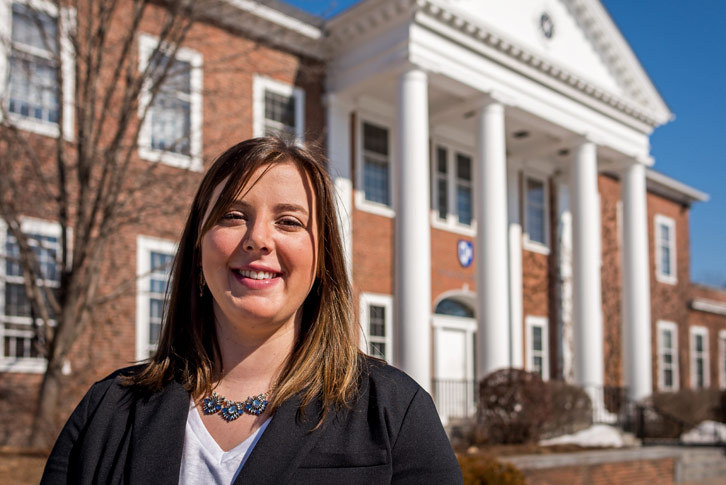The health care issues that New Hampshire faces are tied up in a complicated knot. Mental health disorders are linked with physical health conditions, and the presence of one can dramatically increase the severity—and costs—of the other. Ideally, treatment should address issues in conjunction, not in isolation. Public health major Stephanie Cameron ’11, a research associate at the Institute for Health Policy and Practice (IHPP) at the University of New Hampshire, knows this. It’s her job to make sure others do, too, and to help health care leaders collaborate in order to ensure New Hampshire residents have the chance to achieve their healthiest selves.
The institute serves as a vehicle to conduct applied research and provide education and technical assistance to improve New Hampshire healthcare. One of Cameron’s main responsibilities is to manage the IHPP program N.H. Citizens Health Initiative and its Behavioral Health Integration Learning Collaborative (BHILC), which helps primary care providers and behavioral health clinicians integrate their care of mental health and medical issues.
“The data show a more significant impact when mental health issues and medical issues are combined,” says Cameron, who joined the IHPP team last August.
Another of Cameron’s projects is the Northern New England Practice Transformation Network (NNE-PTN), which supports clinicians in improving their quality of care and moving towards a value based payment model.

Cameron’s work varies from week to week, and even from day to day as both the BHILC and PTN have several components of which she is involved. She plans meetings with stakeholders and manages the logistics of N.H. Citizens Health Initiative’s events.
The best part of her job, Cameron says, is seeing the outcomes of her efforts. The N.H. Citizens Initiative just released a white paper for behavioral health, and the document serves as both a resource for providers and a physical representation of the organization’s work. It’s also a reminder that creating a healthier population takes place beyond a hospital setting.
Prepared to Succeed
In many ways, Cameron’s career is a natural extension of her undergraduate studies, during which she developed a passion for expanding preventive care in local communities. In Cameron’s hometown of Claremont, N.H., the county teen pregnancy rate was nearly double the state average. Cameron knew teen pregnancy was a symptom of a larger culture, however, and her Capstone explored potential prevention tactics to address the whole picture.
She also completed an internship at New London Hospital that focused on helping to develop a tobacco cessation program, and she helped plan the hospital’s annual health fair.
“That was my first exposure to seeing an event through from start to finish,” recalls Cameron. “It really helped with a lot of what I do today.”
After graduating from Colby-Sawyer, Cameron wanted to save the world and joined AmeriCorps to mentor at-risk kids at her former high school. It was humbling work, she admits. She then worked as an LNA and as a program coordinator in the Norris Cotton Cancer Center at Dartmouth-Hitchcock Medical Center. Now, Cameron and her colleagues are resources for providers like the ones with whom she once worked.
Last May, Cameron earned a master’s degree in public health from the University of New England. She is training for additional certification and considering expanding her educational credentials. Though she hasn’t given up on saving the world, she now knows it’s not going to happen overnight.
“Making change is a process, and it takes time,” she says.
It takes an entire state, too, along with a lot of talented, motivated people like Cameron to facilitate that change.